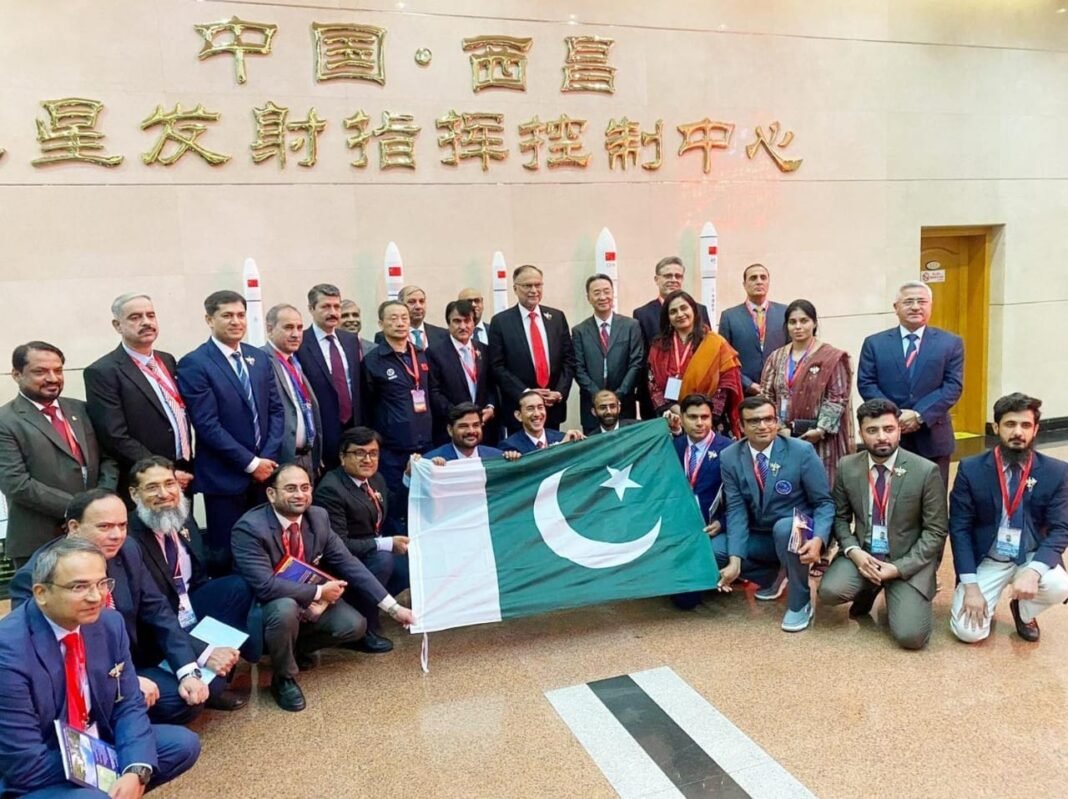Xichang, 1 June 2024 (TDI): “The relationship between Pakistan and China has always been strong, but with this satellite project, we are taking it to new heights, literally touching space.” Minister Ahsan Iqbal emphasized that the launch of PAKSAT-MM1 is a new feather in the cap of CPEC.
This collaboration not only strengthens our bond but also brings tangible benefits to the people of Pakistan, particularly those in remote and hard-to-reach areas.
Minister Ahsan Iqbal shared these views with the Vice President, (of China Aerospace Science & Technology Cooperation (CASC) ahead of the launch of a satellite in Xichang, China.
At the launch site on Thursday, Planning Minister Prof. Ahsan Iqbal met Ambassador Wang Fu Kang from the Asia Department of the Chinese Foreign Office.
He exchanged ideas with the Chinese Ambassador on future space technology and deepened collaboration between Pakistan and China.
Iqbal was accompanied by Pakistan’s Ambassador to China, Khalil Hashmi, and Chairman SUPARCO, Muhammad Yousuf Khan. According to information released by SUPARCO, this satellite is equipped with SBAS (Pakistan Space Based Augmentation System), which makes Pakistan the 11th country in the world to have its own SBAS— after India, the United States, Russia, China, Japan, Europe, South Korea, Australia, Nigeria, and Algeria.
Commending the hard work of scientists and engineers at the Space and Upper Atmosphere Research Commission (Suparco) and all those involved in this mission, the minister said that they have ushered Pakistan into a new digital revolution.
This technological milestone follows Ahsan Iqbal’s 5E framework which he launched in 2023 as Federal Minister for Planning, Development and Special Initiatives.
The framework offers a tangible plan for economic revival in five priority areas one of which is e-Pakistan. This priority area recognizes the transformative power of information and communication technology and hence aims to build a digital economy and enhance digital infrastructure in Pakistan.
Earlier, the minister also met Pakistani scientists, engineers, and the SUPARCO team. Ahsan Iqbal was on a 2-day tour in China to meet key officials involved in the satellite launch.
A day before the launch, Iqbal held a meeting with Lin Yiming, Vice President of the China Aerospace Science and Technology Corporation (CASC), to discuss the ongoing collaboration between Pakistan and China in the field of satellite technology.
During the meeting, Minister Iqbal commended the dedicated efforts of CASC and China Great Wall Industrial Cooperation in their joint endeavor to produce a satellite that will benefit millions of Pakistanis living in remote areas.
The satellite, a testament to the strong partnership between the two nations, will provide crucial connectivity, access to digital education, healthcare services, and e-commerce opportunities to underserved communities across Pakistan.
The satellite project is a significant step towards bridging the digital divide in Pakistan, providing essential services to those who need them most. The satellite will trigger a revolution in communication and connectivity across Pakistan.
It is expected to have a transformative impact on the lives of millions of Pakistanis, empowering them with the tools and resources needed to thrive in the digital age.
Minister Iqbal said, “The launch of PAKSAT-MM1 is a new feather in the cap of CPEC and now Cooperation in Space Technology has formally entered the framework of CPEC.”
Minister Iqbal further said that the launch of PAKSAT-MM1 a few days before the visit of Honorable Prime Minister Shehbaz Sharif to China is a reflection of what Pak and China are set to achieve together.
Minister Iqbal also recommended to Lin Yiming that CASC (China Aerospace Science & Technology Cooperation) should develop a research center in Pakistan and benefit from young Pakistani scientists and engineers.
Also Read: Pakistan’s satellite MM1 set to launch in China
Vice President, of China Academy of Space Technology (CAST) and Chairman, of China Great Wall Industry Corporation (CGWIC) also congratulated Pakistani Engineers who worked on the satellite and hailed them as equally talented.
Hours before the satellite launch, Ahsan Iqbal was interviewed by local media in Xichang, China, about the launch of the Pakistan Multi-Mission Satellite 1.
“The successful launch of PAKSAT-MM1 is the outcome of extensive hard work and cooperation between SUPARCO Pakistan and the Chinese Aerospace Industry, stated the Minister while proudly highlighting the remarkable example of technological cooperation between the two countries.
The Diplomatic Insight is a digital and print magazine focusing on diplomacy, defense, and development publishing since 2009.



